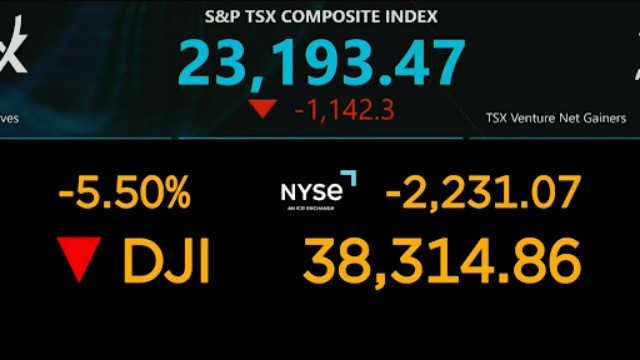
The TSX and the Dow Jones Industrial Average were recorded at 4:00 p.m. on April 4, 2025.
Wall Street closed its worst week since the COVID-19 market meltdown, as a fresh trade blow between the U.S. and China sent stocks into a sharp downward spiral. On Friday, the S&P 500 plunged 6% after China responded directly to U.S. President Donald Trump’s tariff hike by imposing its own steep duties on American imports. The Dow Jones Industrial Average fell by a massive 2,231 points, or 5.5%, while the Nasdaq slid 5.8%, dipping more than 20% below its December peak.
The retaliation from Beijing intensified an already tense economic standoff, raising fears of a looming global recession. China’s Commerce Ministry announced a 34% tariff on all U.S. imports, matching Washington’s recent move. These duties will take effect from April 10, rattling investor confidence across the globe.
This financial freefall affected nearly every major asset class. Out of the 500 companies in the S&P 500, only 14 managed to avoid losses on Friday. Crude oil prices sank to their lowest levels since 2021. Even copper, often considered a key barometer of economic health, tumbled as markets braced for slower global growth.
Although a stronger-than-expected U.S. jobs report briefly paused the panic, it wasn’t enough to stop the overall decline. Employers added more jobs than predicted, a sign the American labour market still has some strength. Yet, markets were more focused on what lies ahead rather than current figures.
Rick Rieder from BlackRock summed up the market mood, saying, “The world has changed.” His words capture the new uncertainty investors now face, as the U.S.-China tariff battle deepens.
The Federal Reserve, which often softens economic shocks by cutting interest rates, may now find its hands tied. Fed Chair Jerome Powell warned that rising tariffs could push inflation expectations higher—something that could trigger more economic pain. Cutting rates might add more fuel to that fire.
Meanwhile, Trump appeared unconcerned. Posting from his private Florida club, he claimed, “THIS IS A GREAT TIME TO GET RICH,” and later hit the golf course. He also took a jab at China, saying they had “panicked” in response to U.S. pressure. Trump continues to suggest the long-term benefit of tariffs outweighs the short-term pain, likening the current disruption to a surgical procedure needed for future health.
Some experts believe the situation could reverse quickly—if both sides decide to negotiate. Brian Jacobsen from Annex Wealth Management noted that the “next surprise for investors could be how fast tariffs get scaled back.”
Still, for companies that rely heavily on China, the damage is already severe. DuPont dropped 12.7% after Chinese regulators launched an antitrust probe into its local subsidiary. GE Healthcare, which earns 12% of its revenue from China, lost 16%.
Global markets mirrored the U.S. collapse. Germany’s DAX index fell 5%, France’s CAC 40 dropped 4.3%, and Japan’s Nikkei slipped 2.8%. In the bond market, Treasury yields declined as investors rushed to safer ground.
The 10-year Treasury yield fell to 4.01%, down from 4.06% the day before. At one point in the morning, it even dipped below 3.90%, highlighting investor anxiety. Though Powell’s remarks helped yields stabilize slightly, the market remains on edge.
Wall Street is now caught between trade war fears and hopes for quick resolutions. What happens next depends on how leaders in Washington and Beijing decide to make their next move.















